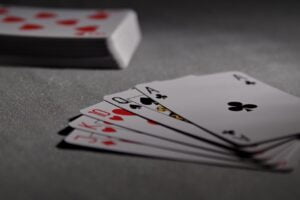Of course poker isn’t just about luck, but it’s hard to win when you’re not dealt the cards that you want. Luck appears to be even more important when playing on the best online poker sites because the usual tells of an “in-person” game aren’t quite there, but can the required luck actually be quantified?
Understanding the Four Pillars of Luck in Online Poker
There are four key sources of luck at play when online poker is played. The first one is where you end up playing. Sure, you can opt for a different table but the chances are that the platform you’re on has multiple servers and it hosts many rooms. There’s a lot of luck involved here as to whether you get put in a room with experienced players or a bunch of rookies.
Another wild element of online poker is the dealing. If you get the best cards or the worst cards, it’s down to total luck. By the same merit, the timing of when certain cards are dealt can also influence the game. The order of the community cards being revealed might be an awesome card that will make you the odds on favorite to win. Yet if that’s the last card, timing might not be on your side.
Opponent behavior. Again, another very hard attribute to quantify but you can get lucky from your opponent’s actions at the table. If they fold too early or if they raise when they shouldn’t, you could end up winning by no real skill of your own. Equally, they could quit the table by mistake by pressing the wrong button on their device. It sounds negligible but it happens enough to be addressed.
How to Measure Luck
If you really want to measure luck then you will need to gather as much information as possible, or you can even take an online quiz to assess your “luckiness”. Essentially you will be trying to record the variance of cards, results, and how players react. This will mean being incredibly attentive when playing online poker but not impossible. You will need to see how often specific cards come out and what the winning hand is and then compare it to resources like the likelihood of that outcome.
You can record your opponent’s behavior but unless you’re playing with the same people every time this information might not be that useful going forward. There are some bespoke software packages out there which plug into your online poker games, some of which record all the data which will make it a lot easier for you to assess the luck.
It’s Better to Be Skilled and Lucky
Part of the appeal of poker is that a humble rookie with the right cards in theory could defeat Phil Ivey in a hand of poker. He got a lucky Royal Flush, but is he skilled at poker? Probably not. The elite poker players who make a living from the sport understand the probabilities in the game and subsequently use their skills to assess their ‘luck’ and chances of winning.
Emotionally Judging Luck
Luck can be a real driver of player behavior when playing online, especially if it’s good luck and they start winning early on. ‘Luck’ can be seriously misjudged during these phases. For this reason (and the fact that it can be extremely difficult or impossible to gauge opponents’ emotions on online poker) luck is even harder to assess when emotions are brought into play.
A Big Sample Size Will Be Needed
If you’re still keen on measuring luck on online poker then sometimes there’s nothing to beat some first-hand anecdotal evidence. Picking a place to actually play and test your luck can be hard, but according to experts, these are the best trending online poker sites leading into 2024. You can read all of the case studies and statistics that you want, but actually just testing out your own luck might be the best measuring stick we have here.
Key Takeaways
While you could commit all your free time to studying your luck in online poker environments, taking account of all available resources – it’s important to know that there’s no real way to quantify or accurately assess your future luck, completely. The odds might suggest you’re due to some good luck but the cards, opponents, and dealer might change your luck.
How to Define and Measure Luck
One way to measure luck in poker would be to simulate multiple games of poker where every game goes to the showdown (being sure to use numerous setups with varying player numbers) and see how many times a player wins the round from an initial losing hand. This will allow you to understand the number of times that a ‘lucky win’ can materialize. Of course, this will provide a guide figure, not concrete guidance.









